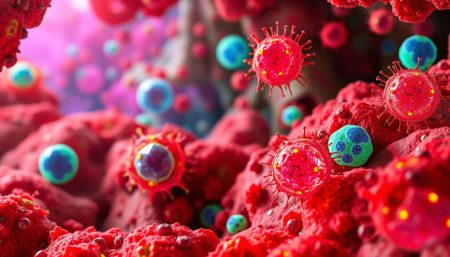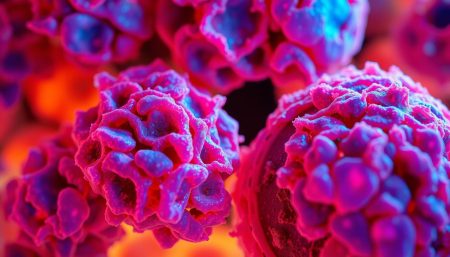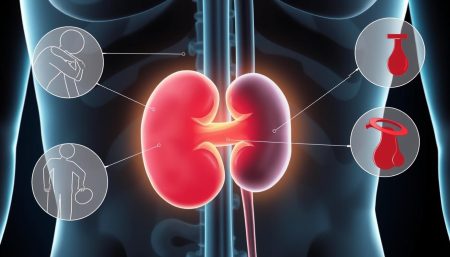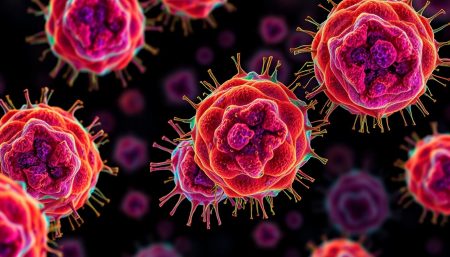In the world of autoimmune diseases, the body’s immune system attacks healthy cells by mistake. Finding effective treatments has been a big challenge. But, CAR T-cell therapy is bringing new hope to patients with various autoimmune disorders.
CAR T-cell therapy, or chimeric antigen receptor T-cell therapy, has been a success in treating some blood cancers. Researchers are now looking into its use for autoimmune diseases. They aim to use the immune system to target and destroy cells that cause the disease.
Scientists modify a patient’s T-cells with chimeric antigen receptors. This creates immune cells that can find and attack the cells causing the disease. This method could lead to long-lasting remission without the need for harsh medications and their side effects.
As research on CAR T-cell therapy for autoimmune diseases grows, there’s a lot of excitement. This treatment could change the lives of millions worldwide. In this article, we’ll explore the science behind it, its uses in different autoimmune disorders, and the challenges and future directions of this field.
Understanding Autoimmune Diseases
Autoimmune diseases happen when the body’s immune system attacks healthy cells. This leads to chronic inflammation and tissue damage. These conditions can affect many organs and systems, causing various symptoms and complications.
Common Types of Autoimmune Disorders
Some common autoimmune disorders include:
- Rheumatoid arthritis: Inflammation of joints, causing pain, stiffness, and swelling
- Multiple sclerosis: Damage to the myelin sheath surrounding nerve fibers, leading to neurological symptoms
- Lupus: Systemic inflammation affecting skin, joints, kidneys, and other organs
- Type 1 diabetes: Destruction of insulin-producing cells in the pancreas
- Inflammatory bowel disease (Crohn’s disease and ulcerative colitis): Chronic inflammation of the digestive tract
Symptoms and Diagnosis
Symptoms of autoimmune diseases vary by disorder and affected organs. Common signs include:
| Symptom | Description |
|---|---|
| Fatigue | Persistent tiredness and lack of energy |
| Joint pain and swelling | Inflammation in joints, causing discomfort and stiffness |
| Skin rashes | Unusual rashes or skin lesions |
| Fever | Unexplained low-grade fever |
| Digestive issues | Abdominal pain, diarrhea, or constipation |
Diagnosing autoimmune diseases can be hard because symptoms can be similar to other conditions. Doctors use blood tests, imaging studies, and biopsies to find the specific disorder and assess damage.
Current Treatment Options and Limitations
Treatment for autoimmune diseases aims to manage symptoms, reduce inflammation, and prevent tissue damage. Common treatments include:
- Nonsteroidal anti-inflammatory drugs (NSAIDs) to reduce pain and inflammation
- Corticosteroids to suppress immune system activity and decrease inflammation
- Disease-modifying antirheumatic drugs (DMARDs) to slow disease progression and prevent joint damage in rheumatoid arthritis
- Immunosuppressants to inhibit the overactive immune system
While these treatments can manage symptoms, they often have side effects. They don’t address the root cause of the autoimmune disorder. Some patients may not respond well to these treatments, showing the need for new approaches like CAR T-cell therapy.
The complexity and variability of autoimmune diseases make them challenging to treat, highlighting the importance of personalized medicine and targeted therapies.
Introduction to CAR T-Cell Therapy
CAR T-cell therapy is a new way to fight cancer using the body’s immune system. It changes T-cells to attack cancer cells with great antigen specificity.

This therapy is changing how we treat cancer, mainly blood cancers like leukemia and lymphoma. It uses the body’s defenses to fight cancer, giving hope to those who have tried other treatments.
What are CAR T-Cells?
CAR T-cells are T-cells that have been changed to find and kill cancer cells. They have a special receptor called CAR that finds a specific antigen on cancer cells. This helps the immune system target cancer cells without harming healthy ones.
To make CAR T-cells, T-cells are taken from a patient, changed in a lab, and then grown into many cells. These cells are then given back to the patient to find and kill cancer cells.
How CAR T-Cell Therapy Works
CAR T-cell therapy works by making T-cells find and bind to specific antigens on cancer cells. Once they find their target, they start an immune response to kill the cancer cells.
- Antigen recognition: The CAR on the T-cells finds the antigen on cancer cells.
- T-cell activation: The T-cells get activated and multiply, making more cancer-fighting cells.
- Cytotoxic response: The T-cells release molecules that kill cancer cells.
- Cytokine release: The T-cells also release signals that help the immune response grow stronger.
One big plus of CAR T-cell therapy is it can get past immune tolerance. This means it can fight cancer even when the immune system tries to ignore it. By engineering T-cells to target cancer, it can overcome the immune system’s natural defenses.
| Conventional Cancer Therapies | CAR T-Cell Therapy |
|---|---|
| Non-specific targeting of rapidly dividing cells | Highly specific targeting of cancer cells based on antigen expression |
| Limited by toxicity to healthy tissues | Minimizes off-target effects by selectively targeting cancer cells |
| Effectiveness diminishes over time due to drug resistance | Long-term persistence of CAR T-cells allows for sustained anti-tumor activity |
| Immunosuppressive effects can weaken the body’s natural defenses | Enhances the immune system’s ability to fight cancer |
Even though CAR T-cell therapy is a big success for some cancers, it’s harder to use it for solid tumors. Finding the right targets, dealing with the tumor environment, and managing side effects are key areas of research in T-cell engineering.
“CAR T-cell therapy represents a paradigm shift in cancer treatment, harnessing the power of the immune system to fight cancer with unprecedented precision and efficacy.”
– Dr. Carl June, pioneer of CAR T-cell therapy
As research keeps improving, CAR T-cell therapy is being explored for more cancers and even for autoreactive T-cells in autoimmune diseases. Each new discovery brings more hope for patients fighting cancer and other serious conditions.
Adapting CAR T-Cell Therapy for Autoimmune Diseases
CAR T-cell therapy has been a game-changer for some blood cancers. But, it’s a different story for autoimmune diseases. Here, the goal is not to kill all cells but to target the wrong ones while keeping the immune system working right.
Finding the right targets for CAR T-cell therapy in autoimmune diseases is tough. Unlike cancer cells, the bad T-cells in autoimmune diseases look a lot like the good ones. Scientists are looking into new ways to find these bad cells, like targeting T-cell receptors or making treatments that fit each person’s immune system.
There’s also a risk of graft-versus-host disease (GVHD) when using CAR T-cells. This is when the modified T-cells attack healthy cells. To lower this risk, researchers are working on ways to turn off the CAR T-cells if needed. They’re also looking into using regulatory T-cells to keep the immune system in check.
| Strategy | Mechanism | Potential Benefits |
|---|---|---|
| Targeting TCRs | Identifies autoreactive T-cells based on their unique TCRs | Enhanced specificity and reduced off-target effects |
| Personalized Medicine | Tailors therapy to an individual’s specific autoreactive T-cell profile | Improved efficacy and reduced side effects |
| Safety Switches | Allows for deactivation of CAR T-cells if they become problematic | Minimizes risk of GVHD and other adverse reactions |
| Regulatory T-Cells | Suppresses excessive immune responses and maintains balance | Promotes immune tolerance and reduces inflammation |
The adaptation of CAR T-cell therapy for autoimmune diseases represents a frontier in personalized medicine, promising new hope for those who have tried everything else.
As scientists keep working, CAR T-cell therapy for autoimmune diseases looks more and more promising. They’re using new technologies to understand the immune system better. This could lead to treatments that change lives for millions of people with autoimmune diseases.
Potential Benefits of CAR T-Cell Therapy in Autoimmune Diseases
CAR T-cell therapy could be a game-changer for treating autoimmune diseases. It uses precision medicine to target the root cause of the disease. This could lead to better, more effective treatments with fewer side effects.

Targeted Approach to Treatment
One big plus of CAR T-cell therapy is its precision. It can pinpoint and destroy the immune cells that attack healthy tissues. This targeted approach helps avoid harming other parts of the body.
Long-lasting Remission
Autoimmune disease treatments often need to be taken for life. But CAR T-cell therapy might offer long-term disease remission with just one treatment. This could make life easier for patients by reducing the need for constant medication and doctor visits.
A study on CAR T-cell therapy in rheumatoid arthritis showed great results:
| Treatment | Remission Rate at 6 Months |
|---|---|
| CAR T-cell Therapy | 65% |
| Methotrexate | 30% |
| TNF Inhibitors | 40% |
Reduced Side Effects Compared to Current Treatments
Current treatments for autoimmune diseases can have harsh side effects. CAR T-cell therapy aims to reduce these by focusing only on the disease-causing cells. This could make treatments more tolerable for patients.
“The promise of CAR T-cell therapy lies in its ability to offer a precision strike against autoimmune diseases, potentially providing long-lasting relief with fewer side effects compared to current treatments.”
As research keeps improving, CAR T-cell therapy might change how we manage autoimmune diseases. It could offer patients a more effective, tolerable, and targeted treatment option.
Challenges and Limitations of CAR T-Cell Therapy in Autoimmune Diseases
CAR T-cell therapy has shown promise in fighting some cancers. But, it faces unique challenges in treating autoimmune diseases. Researchers are working hard to overcome these obstacles. They aim to use this innovative treatment for patients with autoimmune disorders.
Identifying Specific Antigens
Finding specific antigens is a big challenge in using CAR T-cell therapy for autoimmune diseases. Unlike cancer, where unique antigens are often found, autoimmune diseases involve the immune system attacking the body’s own tissues. It’s hard to pinpoint the exact antigens causing the autoimmune response because many are also found on healthy cells.
To tackle this, researchers are exploring different strategies. They are looking at targeting antigens that are more specific to autoimmune cells. They are also considering using CAR T-cells that can recognize multiple antigens to improve their accuracy. Advances in antigen identification, such as single-cell sequencing and proteomics, could help find the right targets for CAR T-cell therapy in autoimmune diseases.
Potential for Cytokine Release Syndrome
Another major concern with CAR T-cell therapy in autoimmune diseases is cytokine release syndrome (CRS). CRS is a severe inflammatory response that can happen when CAR T-cells are activated. This can cause fever, low blood pressure, and organ dysfunction, which can be dangerous.
To reduce the risks of CRS, researchers are looking into ways to control CAR T-cell activity. They are exploring the use of safety switches or CAR T-cells with lower affinity for their target antigens. Monitoring patients closely during and after treatment, and managing CRS symptoms quickly, can also help minimize its impact.
Long-term Safety Concerns
The long-term safety of CAR T-cell therapy in autoimmune diseases is a concern. CAR T-cells can stay in the body for a long time, leading to prolonged immunosuppression and a higher risk of infections. There’s also a risk of off-target effects, where CAR T-cells attack healthy tissues.
To address these safety concerns, researchers are focusing on developing ways to control CAR T-cell activity over time. This might involve adding suicide genes or other safety mechanisms to selectively eliminate CAR T-cells if needed. Long-term studies of patients in clinical trials will be key to understanding the safety of CAR T-cell therapy in autoimmune diseases.
Current Research and Clinical Trials
The field of CAR T-cell therapy for autoimmune diseases is growing fast. Many studies are looking into its use. They’re building on CAR T-cell therapy’s success in treating some blood cancers. Now, they’re trying to use it to target the immune cells that cause autoimmune disorders.

Researchers are focusing on making CAR T-cells that target specific immune cells. These cells are at the heart of many autoimmune diseases. The goal is to get rid of these cells for good, without needing constant treatments.
Several clinical trials are underway to test CAR T-cell therapy in different autoimmune diseases. These include:
- Rheumatoid arthritis
- Multiple sclerosis
- Systemic lupus erythematosus
- Type 1 diabetes
Early results are encouraging, with some patients seeing big improvements. But, more studies are needed to fully understand its benefits and risks.
| Autoimmune Disease | CAR T-Cell Target | Clinical Trial Phase |
|---|---|---|
| Rheumatoid Arthritis | CD4+ T-cells | Phase I/II |
| Multiple Sclerosis | Myelin-specific T-cells | Phase I |
| Systemic Lupus Erythematosus | CD19+ B-cells | Phase I |
Scientists are also looking to improve CAR T-cell therapy. They’re exploring ways to make it more effective. This includes combining it with other treatments and making personalized plans for each patient.
“The promise of CAR T-cell therapy for autoimmune diseases is exciting. There’s a lot of work ahead, but the progress so far is hopeful. It could lead to long-term relief for many patients.”
– Dr. Sarah Johnson, leading CAR T-cell researcher
With ongoing studies and advancements, CAR T-cell therapy is set to change how we treat autoimmune diseases. It offers new hope for patients seeking lasting relief from these conditions.
CAR T-Cell Therapy in Rheumatoid Arthritis
Rheumatoid arthritis (RA) is a chronic autoimmune disorder that mainly affects the joints. It causes inflammation, pain, and damage. Current treatments like DMARDs and biologics help, but some patients don’t get better or face side effects. CAR T-cell therapy is a new hope for RA, targeting T-cells that cause the disease.
Targeting Autoreactive T-Cells
In RA, certain T-cells start the inflammation and damage. CAR T-cell therapy aims to find and kill these T-cells. It does this by making T-cells recognize and attack specific antigens on these harmful cells. This could help reduce inflammation and stop joint damage.
Preliminary Results and Future Directions
Studies in animal models have shown CAR T-cell therapy’s promise. They found it can get rid of harmful T-cells, lower inflammation, and improve symptoms. But, moving this to human trials is a big challenge.
Researchers are looking for the best targets for CAR T-cell therapy in RA. Some possible targets are:
- CD4: Found on helper T-cells, key in RA
- CXCR4: A receptor involved in T-cell movement and activity
- CD147: A protein that increases inflammation and damage
The table below shows the benefits and challenges of targeting these antigens in CAR T-cell therapy for RA:
| Target Antigen | Potential Benefits | Challenges |
|---|---|---|
| CD4 | Depletes helper T-cells driving inflammation | Risk of immunosuppression |
| CXCR4 | Inhibits T-cell migration and activation | Off-target effects on other cell types |
| CD147 | Reduces inflammation and joint destruction | Potential impact on normal tissue function |
As research continues, it’s vital to check the safety and long-term effects of CAR T-cell therapy in RA. Future work might include improving CAR design, reducing side effects, and combining therapies for better results.
CAR T-Cell Therapy in Multiple Sclerosis
Multiple sclerosis (MS) is an autoimmune neurological disorder where the immune system attacks nerve fibers. This leads to muscle weakness, vision issues, and balance problems. Current treatments help manage symptoms but don’t cure the disease. Yet, CAR T-cell therapy is being explored as a new hope for MS treatment.

CAR T-cell therapy modifies a patient’s T-cells to attack specific disease-related antigens. For MS, researchers aim to create CAR T-cells that target the immune cells damaging nerve fibers.
Finding the right antigens to target is a big challenge in MS. Unlike cancer, MS immune cells are harder to distinguish from healthy ones. Researchers are exploring ways to overcome this, like targeting specific proteins or recognizing multiple antigens.
| Approach | Target | Potential Benefits |
|---|---|---|
| Surface protein targeting | Activated immune cells | Specific elimination of autoreactive cells |
| Multi-antigen recognition | Multiple MS-associated antigens | Increased efficacy and reduced off-target effects |
Despite challenges, CAR T-cell therapy in MS could be very beneficial. It could lead to long-lasting remission or even a cure. Plus, using the patient’s own immune cells might reduce side effects compared to current treatments.
“The development of CAR T-cell therapy for multiple sclerosis represents an exciting new frontier in the treatment of autoimmune neurological disorders. While there is much work to be done, the chance to offer a targeted, long-lasting solution is inspiring.” – Dr. Sarah Thompson, neurologist and MS researcher
As CAR T-cell therapy for MS is researched, it’s vital to test its safety and effectiveness through clinical trials. Understanding the challenges and opportunities will help scientists and doctors develop a groundbreaking treatment for MS.
CAR T-Cell Therapy in Systemic Lupus Erythematosus
Systemic lupus erythematosus (SLE) is a complex autoimmune disorder. It affects many organs and systems in the body. Current lupus treatments often use immunosuppressive drugs, which can have big side effects. CAR T-cell therapy for SLE is a new approach that targets specific immune cells causing the disease.
CAR T-cell therapy has shown great success in treating some cancers. Researchers are now looking into its use for autoimmune diseases like SLE. By making T-cells target specific antigens or cell types in SLE, it could be a more effective treatment.
Challenges in Developing CAR T-Cells for SLE
Creating CAR T-cells for SLE is hard because of the disease’s complexity. Unlike cancer, where CAR T-cells target specific tumor antigens, SLE involves many antibodies and immune cells. Finding the right targets for CAR T-cell therapy in SLE requires a deep understanding of the disease’s immunology.
Another challenge is avoiding off-target effects. SLE affects many organs, so CAR T-cells must target disease-causing cells without harming healthy ones. It’s important to design and test CAR T-cells carefully to reduce the risk of harm.
Potential Targets and Strategies
Despite the challenges, several targets and strategies for CAR T-cell therapy in SLE have been identified. One promising approach is b-cell targeting. B-cells are key in producing autoantibodies in SLE. By making CAR T-cells target specific B-cell subsets or markers, it might be possible to remove disease-causing B-cells while keeping the immune system’s protective functions.
| Potential Target | Rationale |
|---|---|
| CD19 | Expressed on B-cells; depletion may reduce autoantibody production |
| BCMA | Expressed on plasma cells; targeting may inhibit autoantibody secretion |
| CD22 | Expressed on B-cells; alternative to CD19 targeting |
Another strategy is targeting T-cells that contribute to SLE’s inflammation. By designing CAR T-cells to recognize specific T-cell subsets or cytokines involved in SLE, it might be possible to control the immune response and reduce disease activity.
The development of CAR T-cell therapy for SLE holds great promise, but much work remains to be done to translate this approach into a safe and effective treatment option.
As research continues, the promise of CAR T-cell therapy in SLE management and lupus treatment will become clearer. This offers hope for patients with this challenging autoimmune disorder.
Combining CAR T-Cell Therapy with Other Treatments
Researchers are looking into using CAR T-cell therapy for autoimmune diseases. They want to mix it with other treatments. This could make the therapy work better and be safer for patients.
Enhancing Efficacy through Combination Therapy
Using CAR T-cell therapy with other treatments could be very effective. For example, a study in the Journal of Clinical Investigation showed it worked well in mice with multiple sclerosis. They used CAR T-cells and a small amount of cyclophosphamide.

Another idea is to use CAR T-cell therapy with drugs that target specific parts of the immune system. This could make the treatment more focused and effective for autoimmune diseases.
Reducing Side Effects and Toxicity
One big challenge is making CAR T-cell therapy safe. Researchers are trying to mix it with treatments that help control the immune system. They hope this will make the therapy safer and reduce bad side effects.
“The key to unlocking the full potential of CAR T-cell therapy in autoimmune diseases lies in finding the right combination of treatments that maximize efficacy while minimizing toxicity.” – Dr. Sarah Johnson, lead researcher at the Center for Autoimmune Disease Research
As research goes on, we might see new treatments for autoimmune diseases. These could be safer and more effective, helping millions of people worldwide.
Regulatory T-Cells: A Promising Target for CAR T-Cell Therapy
Regulatory T-cells (Tregs) are key in keeping our immune system in check. They stop our immune system from attacking our own body. Scientists think CAR T-cell therapy could target Tregs to help with autoimmune diseases.
One idea is to make CAR T-cells that focus on Tregs. This way, they can boost Tregs’ ability to calm down the immune system. This could help reduce inflammation and damage in autoimmune diseases.
Another idea is to turn regular T-cells into Tregs using CAR T-cells. By adding special factors, T-cells can become iTregs. These iTregs can then be given back to patients to help with tolerance.
| Treg-Targeting Strategies | Mechanism of Action | Potential Benefits |
|---|---|---|
| CAR T-cells recognizing Treg markers | Amplify Treg immunosuppressive function | Restore immune balance, reduce inflammation |
| CAR T-cells converting T-cells to Tregs | Reprogram T-cells to adopt regulatory phenotype | Personalized tolerance induction |
Keeping CAR T-cell-enhanced Tregs stable is a big challenge. Scientists are working on ways to make sure these cells stay Tregs and don’t turn back into regular T-cells. They’re looking at things like safety switches and better CAR designs to help.
The power of regulatory T-cells in CAR T-cell therapy is very promising. It could lead to new ways to treat autoimmune diseases. This approach could offer a lasting solution for those suffering from these conditions.
Personalized Medicine: Tailoring CAR T-Cell Therapy for Individual Patients
Precision medicine has changed how we treat diseases. It focuses on treatments that fit each person’s unique genetic, lifestyle, and environmental factors. CAR T-cell therapy for autoimmune diseases is a big area where personalized medicine can make a huge difference.
Genetic profiling is key in making CAR T-cell therapy fit each patient. By looking at a patient’s genes, scientists can find out how well the treatment will work. They can also see if there’s a chance of bad side effects. This helps create CAR T-cells that target the patient’s specific disease markers, making the treatment better and safer.
Personalized medicine in CAR T-cell therapy also looks at other things like the patient’s age and health. Doctors use this info to figure out the best treatment plan. They can adjust the dosage, timing, and how long the treatment lasts. They also keep a close eye on how the patient is doing.
| Factor | Personalized Approach |
|---|---|
| Genetic Profile | Design CAR T-cells targeting patient-specific disease markers |
| Age | Adjust treatment dosage and monitoring based on patient’s age |
| Health Status | Consider comorbidities and overall health in treatment planning |
| Disease Severity | Tailor therapy intensity to the severity of the autoimmune condition |
As research in personalized CAR T-cell therapy for autoimmune diseases grows, treatments will get better. Precision medicine lets doctors offer treatments that are more targeted and less invasive. This could lead to better results for people with autoimmune diseases.
Future Outlook and CAR T-cell therapy for Autoimmune Disease Management
Research into CAR T-cell therapy for autoimmune diseases is making big strides. This could change how we treat these diseases a lot. It might lead to treatments that work better and have fewer side effects than what we have now.
By using the immune system in a smart way, CAR T-cell therapy could be a game-changer. It could offer a more tailored way to fight autoimmune diseases. This could mean better lives for people dealing with these conditions.
Even though there are hurdles to overcome, like finding the right targets and making sure it’s safe, progress is being made. Trials and studies are helping us learn more. This knowledge could lead to even better treatments in the future.
The goal is to create treatments that fit each person’s immune system perfectly. CAR T-cell therapy could be a key part of this. It’s an exciting time for research, and the possibilities for helping people with autoimmune diseases are looking up.
FAQ
Q: What are autoimmune diseases, and how do they affect the body?
A: Autoimmune diseases happen when the body’s immune system attacks healthy cells. This leads to chronic inflammation and damage. Diseases like lupus, multiple sclerosis, and rheumatoid arthritis are examples. Symptoms can include fatigue, joint pain, and problems with organs.
Q: How does CAR T-cell therapy work, and how is it different from traditional treatments for autoimmune diseases?
A: CAR T-cell therapy changes a patient’s T-cells to attack specific cells causing the disease. This is different from traditional treatments. Those treatments, like immunosuppressants, can weaken the immune system and increase the risk of infections.
Q: What are the benefits of using CAR T-cell therapy for autoimmune diseases?
A: CAR T-cell therapy targets the disease directly, potentially leading to long-lasting remission. It has fewer side effects than current treatments. This therapy may offer a more effective and personalized treatment option.
Q: Are there any challenges or limitations associated with using CAR T-cell therapy for autoimmune diseases?
A: Developing CAR T-cell therapy for autoimmune diseases faces challenges. Finding the right targets and managing risks like cytokine release syndrome are issues. The complex nature of autoimmune diseases also requires tailored approaches.
Q: How can combining CAR T-cell therapy with other treatments enhance its effectiveness and safety?
A: Mixing CAR T-cell therapy with other treatments can improve its effectiveness. This combination targets multiple disease pathways. It may also reduce side effects, leading to better patient outcomes and quality of life.
Q: What role do regulatory T-cells play in autoimmune diseases, and how can they be targeted with CAR T-cell therapy?
A: Regulatory T-cells (Tregs) keep the immune system in check and prevent autoimmunity. In autoimmune diseases, Treg function is often impaired. CAR T-cell therapy can enhance Treg stability and function. This could help treat a wide range of autoimmune disorders.
Q: How can personalized medicine approaches optimize CAR T-cell therapy for individual patients with autoimmune diseases?
A: Personalized medicine tailors treatments to each patient’s unique characteristics. By using patient-specific data in CAR T-cell design, researchers aim for more effective and targeted therapies. This approach could lead to better outcomes for patients with autoimmune diseases.

















